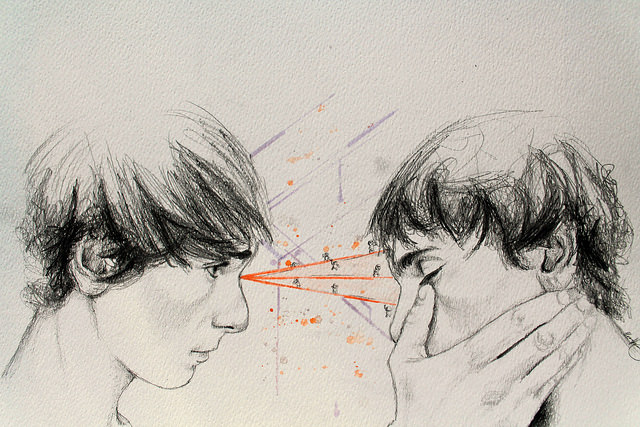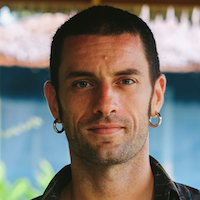
Are you against the mind? Do you think the mind is your enemy?
You’re not alone. In New Age spirituality, the mind is often portrayed as the biggest obstacle to our personal and spiritual growth.
The barrier between us and enlightenment, the great dragon to slay in order to find the treasure of self-realization, the mind doesn’t have a great reputation nowadays—at least, not among self-appointed “spiritual” people.
As a direct consequence of this, we may observe some hype around all that is physical and embodied, or, as some would say, “experiential” (we will come back to this definition in a minute). New Age spirituality has popularized “touchy-feely” practices where mind and reasoning are mainly, if not completely, left out.
This tendency is everywhere—in yoga, with the flourishing of styles that emphasize the physical aspect and downplay the mental; in Tantra, with the surge of experiential workshops where people spend hours cuddling each other, with little if any spiritual background; in meditation, with the popularity of styles that are all about “shutting down the mind” and “re-connecting with the body”; even in popular language, where “being in the mind” has become a synonym of being disconnected, rigid, stuck in unhealthy patterns, while connecting with body and feelings is the cure for all evil.
But wait a second, was this mistrust of the mind always there?
Not really. As soon as we look past the last 50 years, we see that many spiritual traditions were highly respectful of the mind.
The Mind in Yoga and Indian Philosophy.
Indian philosophy, for example, held the mind in great consideration and studied it with the utmost care, as is shown by the richness of vocabulary around the different faculties of the mind.
The Sanskrit name for the “discriminative intellect” (corresponding to our “rational mind”) is buddhi. Does this sound familiar? Yes, buddhi and Buddha are linked. There is a connection between developing a discriminative intellect and attaining the state of self-realization that grants one the title of Buddha.
In Yoga, it said that one reaches the highest spiritual states through the practice of viveka, discernment, and vairagya, non-attachment. Viveka describes a relentless inquiry into the Self, the nature of Truth and the nature of reality. And what may be the tool of this inquiry? The mind, of course, in its highest logical and rational form.
Sri Aurobindo, the Indian yogi and sage famous for giving birth to the so-called “integral approach” to spirituality, offers a wonderfully complete and sensible depiction of the mind and its place in the scheme of things. According to Aurobindo, the manifested reality that surrounds us is made up of three fundamental layers: matter, life and mind. Each of these layers “grows” upon the lower one and transcends it. Thus, matter evolves into life, and life evolves into mind.
In a sense, we could say that the purpose of matter is to create life, and that the purpose of life is to create mind.
It is true that evolution does not stop at the level of the mind. Aurobindo speaks of the “supermind,” a stage above the mind that grants access to the superior planes of pure consciousness and being. In other words, there is a basis of truth to the idea that evolution ultimately brings us beyond the rational level of the mind. But this journey can only happen through the mind, and mind remains a necessary step to accessing pure being—a step which we cannot bypass.
Beyond the mind, or below it?
What’s the problem, then?
Unfortunately, popular New Age spirituality often confuses “going beyond the mind” with “stopping before the mind,” or in other words, confuses being beyond rationality with being below it. This may result in the erroneous idea that the path of spirituality is one which denies the mind.
Well, if being below the level of rationality were a mark of evolution, then our favorite pets would be Buddhas. I hope I don’t upset any dog and cat lovers by saying that this is not the case.
In reality, when spiritual teachers speak of “no-mind,” they mean that we should try and go beyond the mind, rather than stopping below it. It is a subtle distinction that makes all the difference between deep, transformational work and spiritual bypassing.
There is, indeed, something true and valuable in the criticism of the mind, and it can be summarized in this way: The mind is our most powerful tool, a marvel of creation. Like any other tool, it is subject to being misused. Having a sledgehammer in your hands is potentially much more dangerous than handling a screwdriver. Yet, no one would try to dig a hole using a screwdriver.
Similarly, giving the mind supremacy over everything else can be just as dangerous as denying it. Listening only to the mind may result in coldness, rigidity and even cruelty. Shutting down the mind, on the other hand, may give rise to savage chaos and destruction. Think of an adult with the reasoning capacity of a one-year-old child; think about him becoming enraged about something, and you have an idea of where “no-mind” can lead.
We don’t expect a one-year-old child to cool down his emotions through reasoning, but we do expect adults to do so. Thankfully, the mind exists!

What Does “Experiential” Mean?
To conclude, let’s come back to that favorite New Age word: “experiential.”
If by experiential we mean the absence of mind, we are way off the mark. On which grounds do we claim that thoughts, ideas, insights or even mathematics are not “experiential?”
Have you ever had one of those “a-ha” moments where a realization came to you—a realization that was indeed a thought? It could be the “eureka” of a scientist discovering a new formula, or the, “I always knew it!” of someone realizing an as-yet-unconscious pattern of behavior.
No one would seriously object to calling those moments important and deep experiences.
Thoughts, just like feelings, are experiences. There’s nothing wrong with valuing “experiential,” as long as it doesn’t imply that thinking is useless. It’s thinking, along with feeling and doing, that brought us where we are now.
It’s time we recognized that the mind is a brilliant instrument, and that we use it for our growth and the benefit of all sentient beings. Let’s honor the mind, understand it, make it stable and refined, and turn it into the springboard for evolution that it was always meant to be.
For him who has conquered the mind, his mind is for him the best of friends; but for one whose mind is uncontrolled, that very mind acts as the worst of enemies.
~ Bhagavad Gita, Chapter 6, v. 6
~
Relephant Read:
5 Potentially Hazardous New Age Myths.
~
Author: Raffaello Manacorda
Editor: Toby Israel
Image: Houser Wolf/Flickr // lucahennig/Flickr
~
 Share on bsky
Share on bsky





Read 0 comments and reply